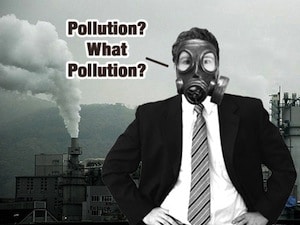With the U.S. Environmental Protection Agency (EPA) set to finally enact stricter air pollution standards in accordance with the Clean Air Act and two subsequent U.S. Supreme Court decisions requiring them to do so, powerful Republicans in the U.S. House of Representatives are working to make sure that the new standards never see the light of day. The specific measures being targeted are the EPA’s new standards for carbon emissions from power plant smoke stacks.
Fred Upton (R-MI), chairman of the House Energy and Commerce Committee, along with Republicans Joe Barton (TX) and Ed Whitfield (KY) sent a letter last week to the White House, demanding that the Obama administration take action to stop the EPA from regulating carbon emissions from power plants.
We are concerned about the regulation’s impact on jobs and the economy, and that it will not comply with all applicable Executive Orders…
In this rulemaking, EPA may be seeking to do precisely what Congress and the American public rejected in the last Congress. The Waxman-Markey cap-and-trade legislation from the 111th Congress would have significantly raised the cost of energy and driven US jobs overseas.
We ask for your help in supporting policies that will encourage economic growth and job creation rather than additional costly regulations that will raise new barriers to job creation and burden struggling businesses and families.
The three men certainly know how to include the buzzwords that appeal to American citizens – jobs, economy, raising energy prices – but when put through the truth test, their claims simply don’t hold up. For example, enacting the new standards has the opposite effect on the job market – it would create tens of thousands additional jobs for American workers, not destroy them. The conservative Heritage Foundation has also been beating the drum about regulations raising energy costs, which could actually happen. However, any rate increases would be a corporate decision, not a government decision. The electric energy industry in America currently generates $370.5 billion a year in revenue, meaning that any rate increases are the result of protecting profits, not because they can’t afford the increase.
So why are these Republicans trying to dismantle the work of the EPA? Simple – they are in the pockets of the dirty energy industry. Fred Upton has received more than $640,000 from electric utilities over his career, and an additional $308,000 from oil and gas. Joe Barton has a combined total of more than $3 million from electric utilities and oil and gas over the course of his career. And Ed Whitfield has gotten more than $600,000 from the two sectors during his tenure in Washington. All of these men have a direct financial stake in the profitability of the dirty energy industry. After all, the more money these companies spend on complying with new standards, the less they have to purchase politicians in Washington.
These latest attacks on the EPA and the environment are not a surprise. In fact, the anti-environmental record of the US Congress over the last year was so awful that Democratic Congressmen Henry Waxman, Edward Markey, and Howard Berman prepared a report last December detailing the numerous ways in which the 112th Congress earned the reputation as the most anti-environmental Congress in history:
House Republicans have repeatedly voted to undermine basic environmental protections that have existed for decades. They have voted to block actions to prevent air pollution; to strip the Environmental Protection Agency of authority to enforce water pollution standards; to halt efforts to address climate change; to stop the Department of the Interior from identifying lands suitable for wilderness designations; to allow oil and gas development off the coasts of Florida, California, and other states opposed to offshore drilling; and to slash funding for the Department of Energy, including funding to support renewable energy and energy efficiency, by more than 80%.
The House of Representatives averaged more than one anti-environmental vote for every day the House was in session in 2011. Of the 770 legislative roll call votes taken in the House this year, 22% – more than one out of every five – were votes to undermine environmental protection. During these roll calls, 94% of Republican members voted for the anti-environment position, while 86% of Democratic members voted for the pro-environment position.
The Environmental Protection Agency was the most popular target of House Republicans. Of the 191 anti-environment votes, 114 targeted EPA
And that was just in their first year. Imagine what they can accomplish the next round of elections this coming November.
Image credit – MZ ChelleyCredible Blog
Subscribe to our newsletter
Stay up to date with DeSmog news and alerts







